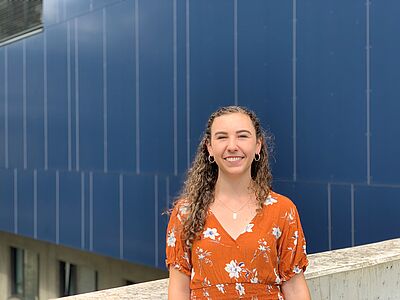Going abroad - but where? That was the question 20-year-old Brenna Cheney faced last year. The California native is studying neuroscience and biomedical engineering in Georgia. So, she set out to find interesting opportunities that could enhance her studies. A few searches and emails later, she came in contact with Marco Gutfleisch, a Ph.D. from Bochum, Germany, who is doing his Ph.D. at the Chair of Human-Centred Security and is part of the Cluster of Excellence CASA. With enrichment funding from Georgia Tech Stamps President’s Scholars program, she is now spending the summer semester at RUB. She will be here from May to August 2022.
Brenna, what is your field of study at your home university?
I’m studying neuroscience at the Georgia Institute of Technology. In the U.S., we major, but have the possibility to minor as well, so I am minoring in biomedical engineering. My traditional educational background is not in computer science, but the research I am involved in at Georgia Tech combines computer science and psychology. The projects here combine a lot of the same ideas.
How is research at the Chair of Human-Centred Security fitting to your research focus?
I chose to study neuroscience because it is interdisciplinary. I like the research here because they have a lot of psychology Ph.D. students in addition to the computer science students and they interview a lot of people to get a variety of perspectives. I thought that was an interesting way to take on this field of research, so I wanted to learn more about how they design and conduct research.
Did you learn more about IT Security?
I have learned a lot about IT Security. The first paper I worked on after arriving at RUB focused on IT Security in the Healthcare Sector. That not only appealed to my interest in interdisciplinary studies, but also fit with my future career aspirations since I plan to pursue a career in medicine. As a result, I have been fortunate to learn about aspects of IT Security that I can apply moving forward.
What does your daily life look like here?
Every day is different, which is amazing. I have attended inaugural lectures from new professors, Ph.D. dissertations, and lectures from guests of the university. I have already learned so much.
What's your biggest take away?
I think it’s about the process of how research works. I do research at my home university as well but in a more limited capacity. I am not as involved in the process of the research design – for large-scale projects like the one I am working on, that’s more up to the professors and the PhDs. Here, I am in the meetings where we plan research designs and figure out what’s working and what has to change.
What is most beneficial for your studies?
There are two things: First, I’m getting opportunities not typical for undergraduates and being treated more like a Ph.D. student – which is the best way to decide if I want to pursue a Ph.D. Second, living and working in a different country has exposed me to perspectives and people I otherwise would not have come in contact with, helping me understand the world and better appreciate other viewpoints.
How would you describe the RUB and Bochum to your people back home?
I would say that Ruhr-Universität is a large, dynamic university. The computer science division, in particular, seems to be rapidly expanding, attracting lots of new professors and students, and with that, new perspectives and more areas of expertise. I would say that the city is small and charming, with a lively main street surrounded by lots of beautiful green areas and small forests to explore.
General note: In case of using gender-assigning attributes we include all those who consider themselves in this gender regardless of their own biological sex


